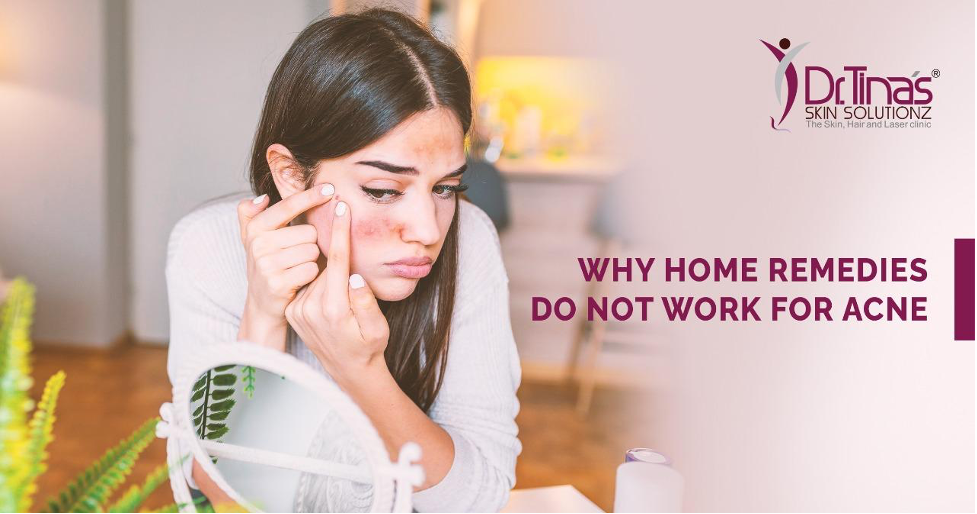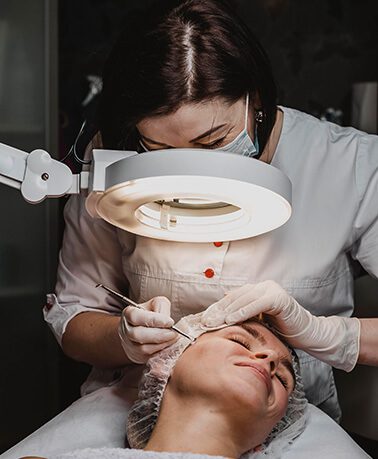Why Home Remedies may not Work for Acne?

Pimple on the face? Applying tea tree oil, toothpaste, garlic, apple cider vinegar, OTC cream, etc is a common practice. Surprisingly awareness of these being caustic to the skin is clear but still rampantly used for acne.
In the quest for clear and glowing skin, People experiment on several household and drugstore products (OTC medications) available in the market with the aim of treating acne. However, stubborn acne, pimples, and blemishes can be a frustratingly long journey of trials and tribulations. This is especially true for acne since they develop on the skin for varied reasons. Popular products and home remedies containing ‘anti-acne’ ingredients may not be the appropriate cure for all kinds of acne. On the brighter side, most cities in India have easy access to dermatological solutions. For instance, you can get the best acne treatment in Bangalore by visiting a skin doctor who can recommend several options.
Why are home remedies popular?
Home remedies usually contain one or more ingredients available within the arm’s reach, as a quick fix to mild issues such as common cold, sore throat, or body pains. Similarly, several home remedies for dermatological issues such as uneven patches, dull skin, and acne have been prevalent for ages.
Readily available substances such as honey, fruits, herbs, and natural oils are used to prepare such treatments. They can sometimes cure common problems without causing negative side- effects. However, they are not beneficial when it comes to treating acne. Let’s take a look at some of the reasons why home remedies do not work for acne.
Superficial Treatment Only
Generally, acne is caused by the build-up of sebum (oil produced naturally from the sebaceous glands), dirt, and dead skin cells. The accumulation causes the pores to get inflamed, resulting in pimples or acne. Additionally, there are internal causes that help acne to develop on the surface of the skin. Hormonal imbalance, food allergies, and even psychological issues such as stress and depression comprise the list of internal causes.
Home remedies, such as spot treatment by applying toothpaste on the acne, target it from the exterior. Even though the toothpaste may help dry out the area, it has a basic pH level that can irritate the skin. Since skin has natural acidic pH values, the toothpaste may cause irritation and therefore, worsen the problem further.
Does Not Solve the Root Cause
Being teenagers, many people tend to rely on turmeric, ginger, and cinnamon as quick solutions for pimples. Many home remedies call them perfect for their anti-bacterial properties. The truth is, these ingredients can actually cause you more harm than good.
Using ingredients such as ginger and cinnamon can irritate your skin and even cause contact dermatitis. Furthermore, you may also experience an allergic reaction to any of the substances when you apply them to your face.
Applying lemon directly to your skin may result in a type of sunburn, called phytophotodermatitis. Moreover, because home remedies are externally applicable in nature, they cannot get to the root of the problem that’s causing the acne.
No Touch of Experts
Skin issues such as acne can be tricky to deal with. You may not realise what is causing your acne when you attempt to treat yourself with home remedies. Experimenting with over-the-counter (OTC) products and homemade solutions can impact your skin negatively.
On the other hand, experienced professionals can assess, evaluate and run tests to get a valid cause of acne. Thus, to receive the most appropriate and best acne treatment in Bangalore, you can leave it to the hands of dermatologists nearby.
They can not only prescribe the right solutions for your acne but also suggest treatment procedures for any scars. The medications that these experts suggest have ingredients in specific quantities which are tried and tested, as opposed to home remedies, that are purely based on assumed measurements.
No Proper Set of Guidelines
Contrary to our expectations, any product or home remedy can take some time to reflect results. It takes a while before your skin can adjust to a certain product or a mixture of kitchen ingredients. Sometimes, your skin may even get worse before it gets better.
Unlike prescribed medications, home remedies do not come with a set of guidelines or dosage. Mostly, people apply them according to their preferences. As a result, it can either be excessive or lower than what suits the skin.
Each product in a prescription has a role to play, like a cleanser that doesn’t dry and damages the barrier of the skin, a moisturizer that can prevent the build-up of acne-causing bacteria. A sunblock that protects from pigmentation post acne. An acne treatment cream that can reduce the activity of the oil gland and remove the sebum and skin. An anti-pigmentation cream to reduce the melanin post redness of acne.
When used Togther it gives the perfect synergistic action for healing. It requires 3 months of usage to see results and maintaining it with the right approach is key for long-term benefits.
The Final Word It is natural to feel impulsive and try out different methods to flatten the red bumps on your skin. Most anti-acne home remedies won’t have much of an effect on the skin in the long run. Although they may play supporting roles good lifestyle modification with a diet supporting health. With proven time-tested, anti-acne treatment drugs should be the foundation of health for your acne-prone skin. The best practice is to consult an expert for acne treatments and procedures to minimise scars.
Added Reading: Acne Care Do’s & Dont’s

Dr.Tina Ramachander is one of the best dermatologist in Bangalore and Medical Director at Dr.Tina’s Skin Solutionz, a skin care clinic in Bangalore. She completed her master’s in dermatology from the well acclaimed JJM Medical college in Karnataka and is now a practicising dermatosurgeon and Medical Cosmetologist in Bangalore.

